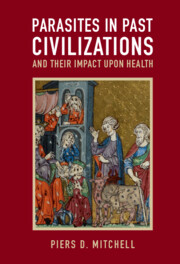Book contents
- Parasites in Past Civilizations and Their Impact upon Health
- Parasites in Past Civilizations and Their Impact upon Health
- Copyright page
- Contents
- Acknowledgements
- 1 Introduction
- 2 Near Eastern Civilizations
- 3 Ancient Egypt and Nubia
- 4 The Prehistoric Peoples of Europe
- 5 The Roman World
- 6 Medieval Europe
- 7 East Asian Civilizations
- 8 North American Indigenous Peoples
- 9 South and Central American Civilizations
- 10 Parasites, Migrations, and Epidemics
- 11 Conclusion
- Bibliography
- Index
9 - South and Central American Civilizations
Published online by Cambridge University Press: 30 March 2023
- Parasites in Past Civilizations and Their Impact upon Health
- Parasites in Past Civilizations and Their Impact upon Health
- Copyright page
- Contents
- Acknowledgements
- 1 Introduction
- 2 Near Eastern Civilizations
- 3 Ancient Egypt and Nubia
- 4 The Prehistoric Peoples of Europe
- 5 The Roman World
- 6 Medieval Europe
- 7 East Asian Civilizations
- 8 North American Indigenous Peoples
- 9 South and Central American Civilizations
- 10 Parasites, Migrations, and Epidemics
- 11 Conclusion
- Bibliography
- Index
Summary
When we consider intestinal parasites, early societies to the east of the Andes were mainly infected by hookworm, whipworm, and to a lesser degree roundworm, thorny-headed worm, and Echinostoma. In contrast, to the west of the Andes fish tapeworm and pinworm were the dominant intestinal parasites, with lower levels of hookworm, dwarf tapeworm, and roundworm. This variation between cultures on either side of the Andes may indicate different approaches to sanitation, as well as the contrasting climate with high rainfall in the east and arid climate to the west. Head lice were found in 60–80% of mummies from Pacific coast societies such as the Chinchorro. Chagas’ disease, spread by the bite of bed bugs, affected 40–50% of Pacific coast civilizations including the Chiribaya and Inca. This causes a slow death from heart failure and intestinal failure. Mucocutaneous leishmaniasis spread by sandfly bites was also endemic in civilizations along the Pacific coast, causing ulcerating destruction of the face.
- Type
- Chapter
- Information
- Parasites in Past Civilizations and Their Impact upon Health , pp. 103 - 116Publisher: Cambridge University PressPrint publication year: 2023

